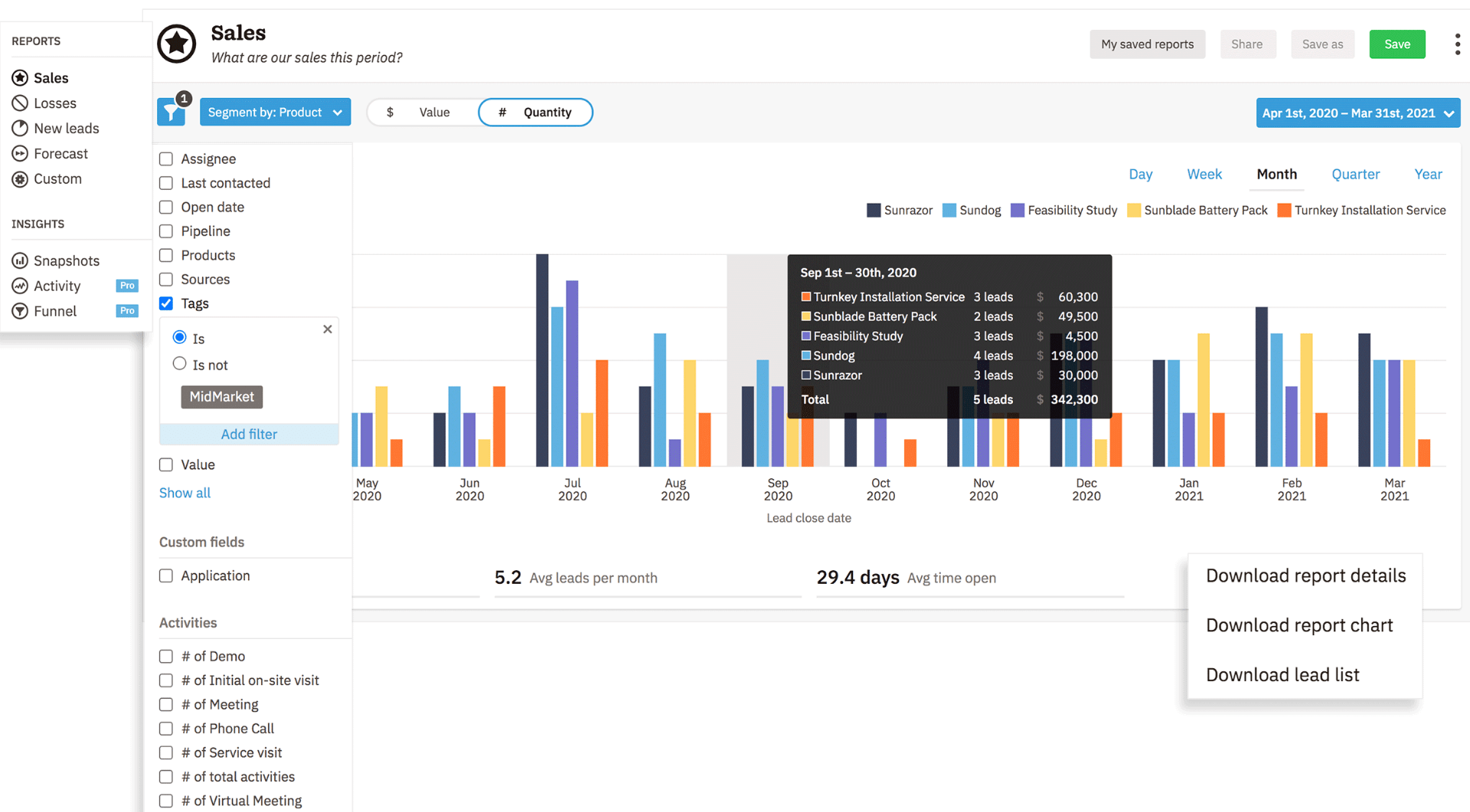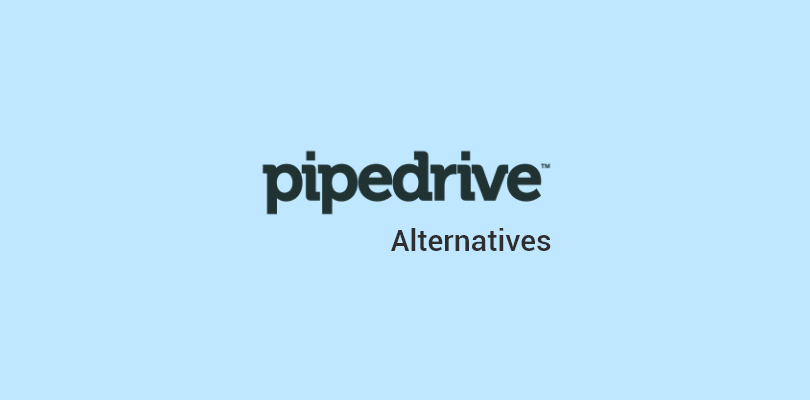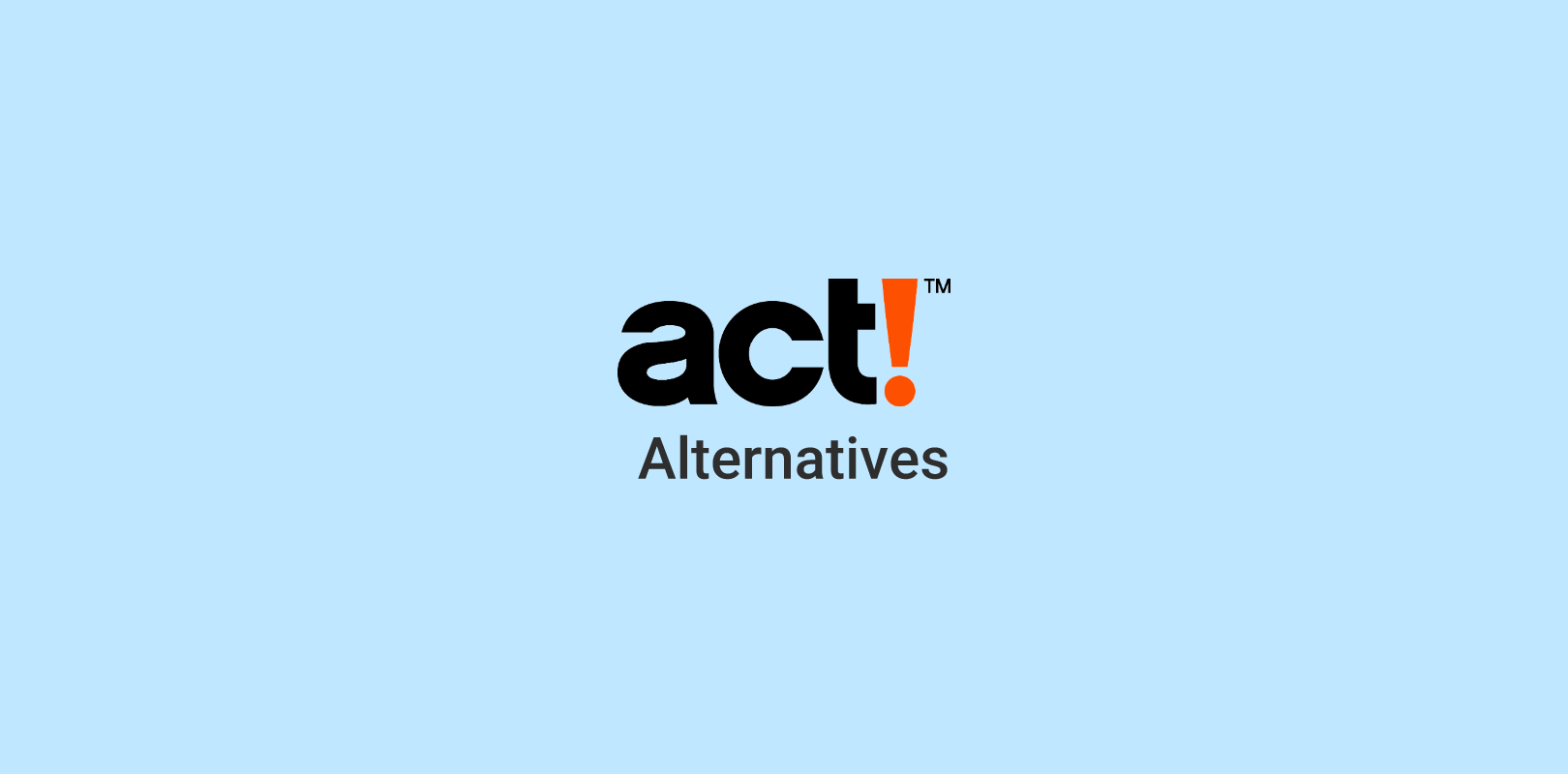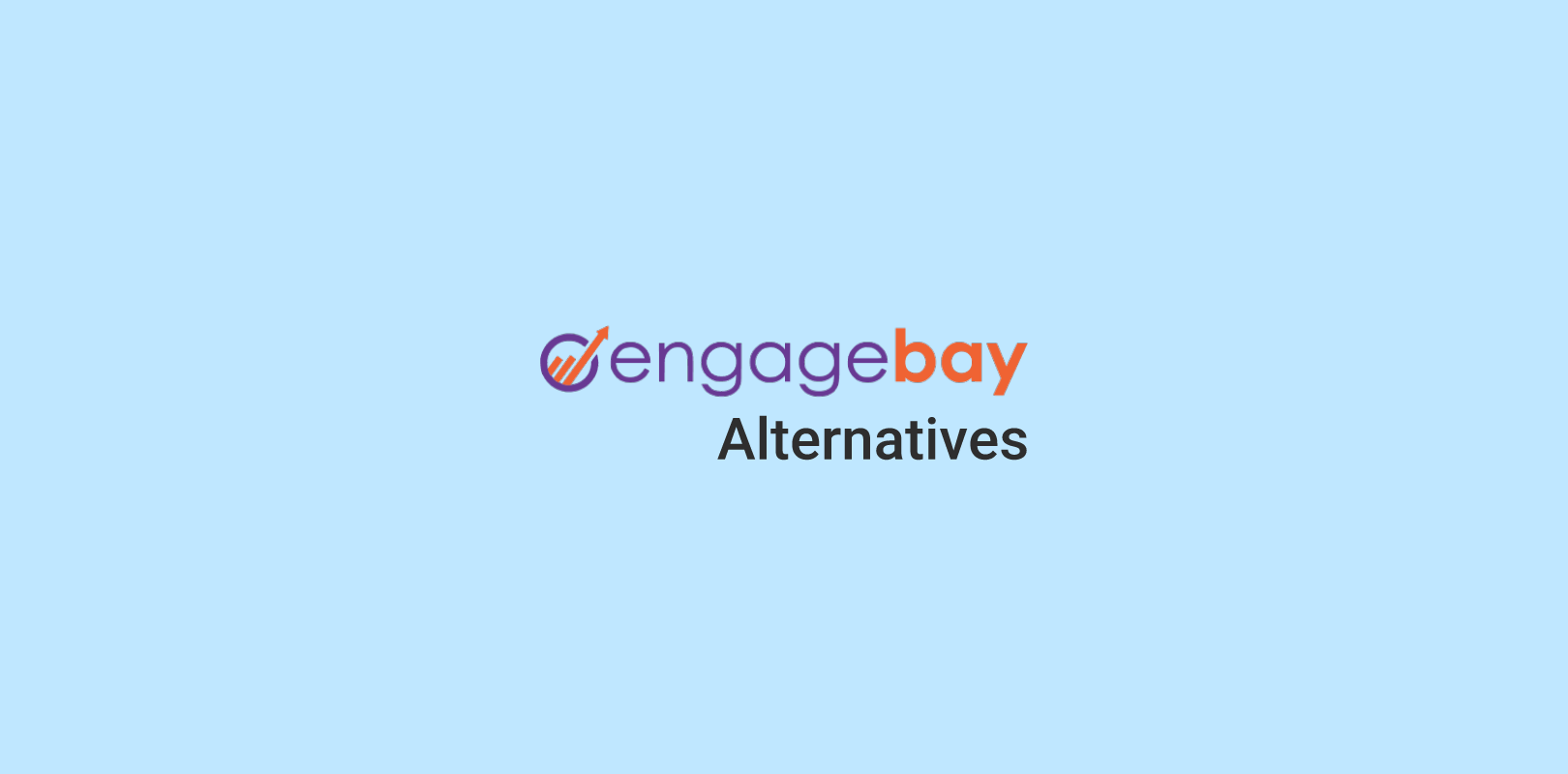Monday.com is great for organizing work and tasks, isn’t it? It makes teamwork and projects so much clearer.
But is it a CRM focused solely on sales activities and relationship building? Probably not!
If you’re part of a startup, small sales team, or a growing business looking for a simple CRM solution to track deals and automate follow-ups, I’ve some top Monday CRM alternatives to share with you. My list consists of 7 alternatives that are easier to use, faster to onboard, and can actually help you boost conversions in 2025.
Let’s find the CRM that works the way your sales team does.
Why Look for Monday CRM Alternatives?
If you’re using Monday CRM software to manage customer relationships, you’ve probably noticed it’s built to handle a lot more than just CRM. And while that flexibility works for some, you might be here because your needs are more focused.
Here are a few reasons others like you start exploring alternatives:
- You want something simpler
Just need to manage contacts, track leads, and send follow-ups? A CRM that’s built specifically for that can save you time and clicks. - You’re mindful of your budget
Some of monday.com’s CRM features—like advanced automation or detailed reporting—are only available in higher-tier plans. You may want something that offers more, right from the start. - You’re running email campaigns
If targeting contacts by interest or funnel stage matters to you, you’ll benefit from a tool with built-in email marketing and segmentation. - You need a CRM that’s purpose-built
monday.com is a great all-rounder, but if you need a system that’s made for nurturing relationships and closing deals, a dedicated CRM could be a better fit. - Your team is growing
As contact lists expand or more team members join in, performance and ease of use become even more important. A CRM designed for scale can make collaboration smoother.
In short: If your priority is building strong customer relationships—without added complexity—a focused CRM alternative could be the perfect next step.
Which Is the Best Monday CRM Alternative?
If you are short on time and need a quick overview, I’ve pinpointed 3 top alternatives to Monday.com sales CRM that could be your perfect fit.
Option A: BIGContacts
BIGContacts is an affordable and efficient contact management system, ideal for SMBs. It includes features like customizable contact records and automated tasks. From sales pipeline management to powerful email marketing tools, BIGContacts provides an all-encompassing solution. It’s not just about managing contacts – it’s about streamlining your entire process and driving sales growth – and BIGContacts fits the bill without being too heavy on your pockets.
Option B: Copper
For those already working within the Google Workspace, Copper CRM might be your perfect match. Copper is especially unique for its native integration with G Suite, providing seamless workflow synchronization. With efficient tracking, intuitive project management, and features designed for collaboration, Copper creates a CRM experience that feels effortless.
Option C: Trello
Trello stands out when it comes to amplified project management. It employs a visual approach to task management, which is clear, flexible, and engaging. By enabling you to organize your deals in a Kanban layout, track task progress, and collaborate with team members within a card-based interface, Trello refines your sales CRM into a highly productive ecosystem.
7 Best monday.com CRM Alternatives
When selecting these CRM alternatives, I considered several factors. These include must-have features such as user-friendliness, customization, and integration capabilities, good reviews reputation, popularity, as well as recommendations from peers and other industry professionals.
| Monday CRM Alternative | Best for | Pricing |
|---|---|---|
| BIGContacts | Contact Management & Workflow Automation CRM for Small & Medium Businesses & Startups | Forever free for small teams. Paid starts at $9.99/month. |
| Nutshell | Sales Automation & Team Collaboration | Starts at $13/user/month. |
| Zoho CRM | Sales Management | Starts at $9.2/user/month. |
| Copper | Google Workspace Integration | Starts at $9/user/month. |
| Bitrix24 | Team Collaboration | Starts at $49/month. |
| Trello | Workflow Automation | Starts at $5/user/month. |
| HubSpot | Centralizing Sales, Marketing, & Support Operations | Starts at $15/user/month. |
1. BIGContacts – Best Contact Management & Workflow Automation CRM for Small Businesses & Startups
Compared to Monday.com, BIGContacts takes a more straightforward approach, which, to me, simplifies the overall experience. The 360° dashboard gave me everything I needed—from contact management to task assignments.
The contact profiles give me a full picture of every client. I can see all emails, notes, files, and follow-ups at a glance, which has saved me hours. Setting up workflows and drip emails took minutes. The task management capability is also noteworthy. It’s nimble, lets you assign, and follow up on tasks effortlessly, and the best part, it keeps your whole team in the loop!
And next, the workflow automation capabilities. You can create task dependencies, automate processes based on specific triggers, schedule personalized drip emails, and more, without any complexity. What really sealed the deal for me was how naturally it fit into my daily routine. I didn’t have to “learn the system” so much as start using it.
What You’ll Like:
- 360° view of contacts with custom fields, ensuring tailored insights
- Easy visual sales pipelines for tracking leads
- Strategies for impactful customer reach with in-built email marketing tools
- Powerful data analytics with CRM reports providing in-depth insights into business performance
- Task tracking with to-do lists and calendar views to simplify project management
Ideal For:
Small business owners, solopreneurs, and nonprofit teams who want a practical CRM to manage contacts, follow-ups, and basic automation—without complexity or high costs.
What Real Users Are Saying:
“BigContacts offers a visual sales pipeline that gives a quick peek into all contacts and their respective stages in the sales cycle, along with other important information. The best part is we can also drag and drop deals to build a custom pipeline that is in sync with the sales cycle.” – Sara (G2)
Ratings:
- G2 Rating: 4.5/5
- Capterra Rating: 4.4/5
Pricing:
Forever free for small teams. Paid starts at $9.99/month.
2. Nutshell- Best for Sales Automation & Team Collaboration
Image Source: Nutshell
If you’ve worked with Monday.com, you know how important automation is for optimizing your sales processes. Nutshell’s Sales Automation feature is its shining star. It is instrumental in improving workflow efficiency by automating time-consuming tasks.
During my time working with Nutshell, I found its team collaboration features to be quite valuable. It provides a shared platform to store customer interactions, making the sales process more coherent.
In contrast to Monday.com, Nutshell offers a more intuitive and clutter-free collaborative experience. You can keep all customer details in one central location, schedule appointments easily, and enhance your understanding of sales performance with detailed reports.
Another highlight is its email marketing feature. It helped me with the creation of email lists, drip series, and funnel-based emails, helping improve my business outreach.
What You’ll Like:
- Automated workflows to trigger emails, assign tasks, and move deals through the pipeline
- Multiple pipeline visualization options: List, Board, Chart, and Map views
- Built-in email marketing features with drip campaigns and performance tracking
- Centralized contact and customer management system, featuring pinned notes to highlight crucial information
Ideal For:
Inside sales teams, B2B SaaS startups, and small to mid-sized businesses that need structured sales automation, contact management, and basic marketing tools in one unified CRM.
What Real Users Are Saying:
“The product is extremely easy to use and customize. The system is very smart and has many modern capabilities, such as recognizing when there is an existing contact, which in turn saves time and redundancies. Everything is very well connected together, and the system makes links that show intel to grow off of.” – Kati (Capterra)
Ratings:
- G2 Rating: 4.2/5
- Capterra Rating: 4.3/5
Pricing:
Starts at $13/user/month.
3. Zoho CRM- Best Sales CRM Solution
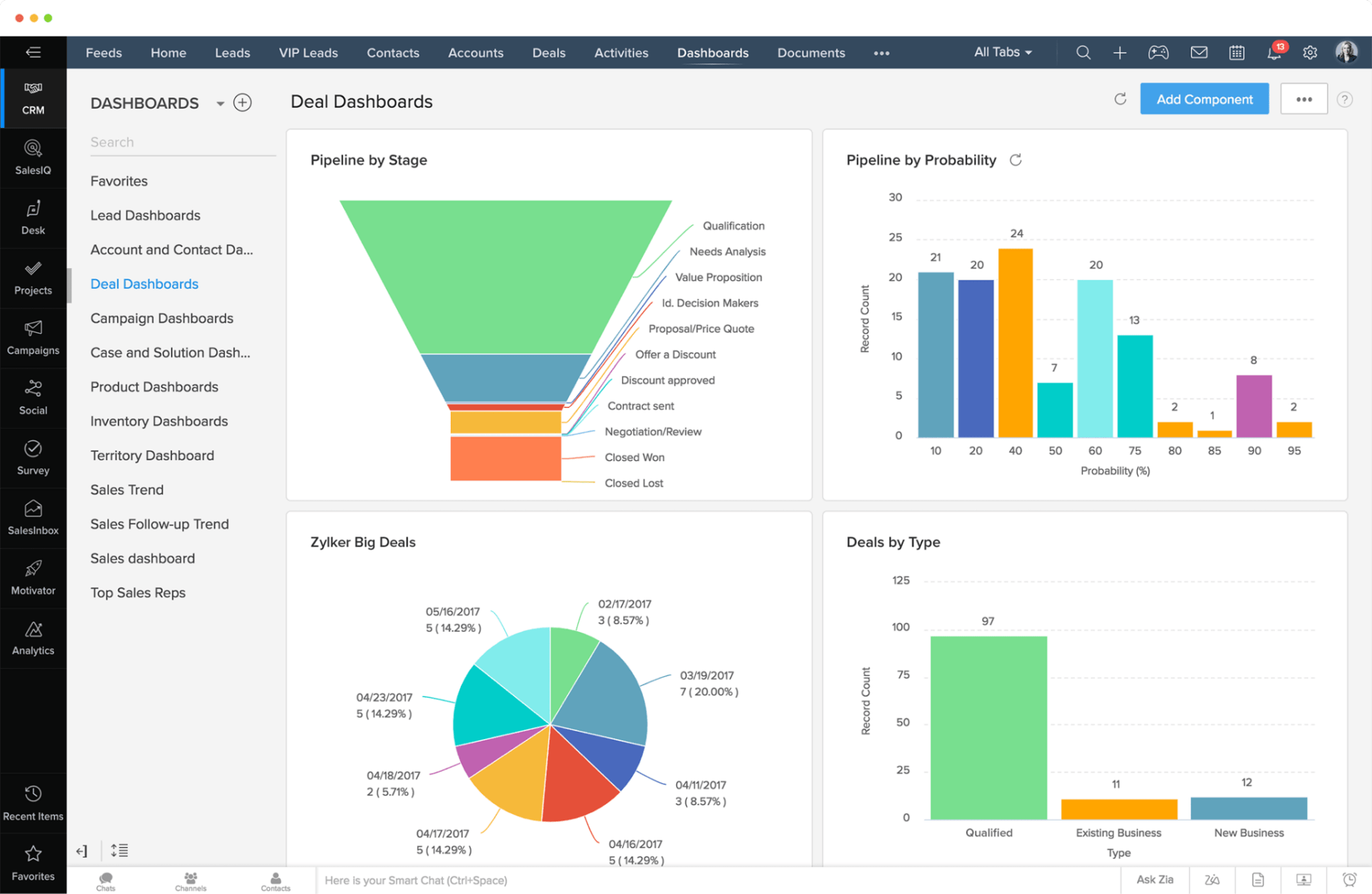
Image Source: Boosted CRM
Zoho CRM structured every part of the sales process—from lead capture to deal closure. The platform gave me full visibility and control over every interaction.
The Blueprint feature was especially useful. I built step-by-step workflows for my reps, ensuring no stage or approval was missed. It improved consistency and reduced onboarding time.
Zoho’s omnichannel tools made communication seamless. I could track emails, calls, chats, and social messages in one place. The AI assistant, Zia, flagged slipping deals, suggested follow-ups, and offered predictive insights. Combined with customizable dashboards, it became a powerful tool for coaching and decision-making. While it takes time to set up, the payoff in automation and visibility is worth it.
What You’ll Like:
- Blueprint builder to guide your team through consistent, approval-based workflows
- Omnichannel communication across email, chat, calls, and social media—all in one place
- AI-powered sales assistant (Zia) that suggests next steps, scores leads, and flags deal risks
- Canvas Design Studio to personalize the UI for different roles
Ideal For:
Sales teams that are scaling fast and need a CRM that can keep up. Great for businesses with structured sales processes, multi-channel engagement, and a need for deep automation and analytics.
What Real Users Are Saying:
“The customization of modules, task automation, and integration with other applications in the Zoho ecosystem make it a very comprehensive solution for business management.” – Fabio (G2)
Ratings:
- G2 Rating: 4.0/5
- Capterra Rating: 4.3/5
Pricing:
Starts at $9.2/user/month.
4. Copper- Best for Google Workspace Integration
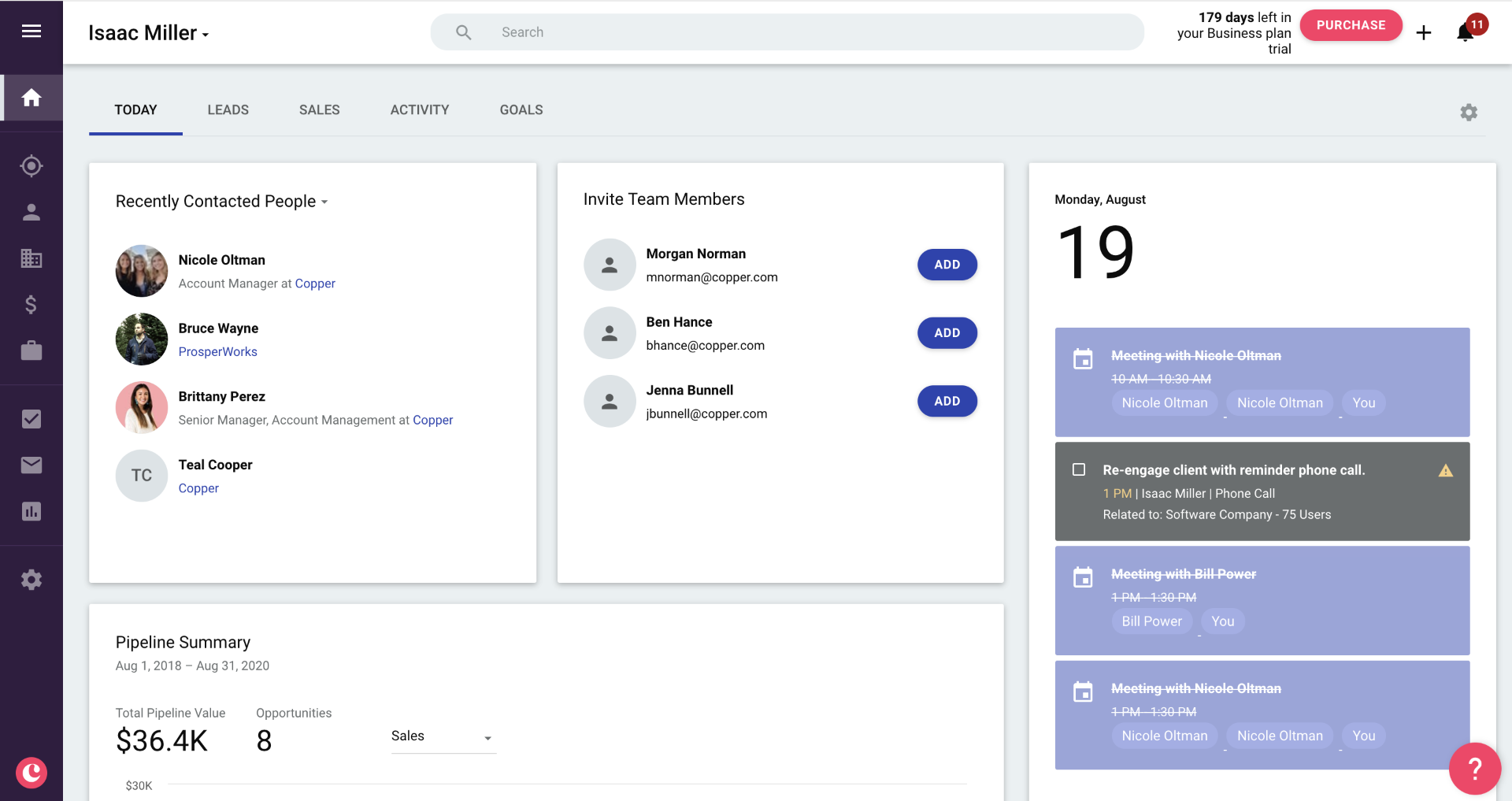
Image Source: Copper Help Center
My experience with Copper CRM showed me that it is fundamentally designed to integrate with Google Workspace. I added leads, updated deals, and scheduled Calendar events directly from my Gmail inbox without needing to switch between tools.
Setting up my sales pipeline was quick. I created stages, tracked progress visually, and added reminders and recurring tasks to stay on top of follow-ups. Copper handled the background work—logging emails, linking conversations to contacts, and keeping records up to date without manual input.
If your team runs on Google Workspace and wants a CRM that blends right into your workflow, this is one of the most efficient Monday.com alternatives you can try. It’s not built for deep customization, but for speed and simplicity—it delivers.
If you’re looking for something with more flexibility or broader features, check out this list of the best Copper CRM alternatives for 2025.
What You’ll Like:
- Native Gmail integration to manage leads and deals without leaving your inbox
- Task automation for reminders, follow-ups, and workflows
- Calendar event creation and contact syncing with Google tools
- Visual sales pipelines with drag-and-drop interface for easy deal tracking
Ideal For:
Google Workspace-based teams, consultants, and client-focused businesses that want a lightweight, inbox-first CRM.
What Real Users Are Saying:
“Copper replaces what I used to need an admin to do half of the time! It works smoothly with my Gmail & Calendar; easy to create lists and keep “clean”.” – Ricci V. (G2)
Ratings:
- G2 Rating: 4.6/5
- Capterra Rating: 4.4/5
Pricing:
Starts at $9/user/month.
5. Bitrix24- Best for Collaboration
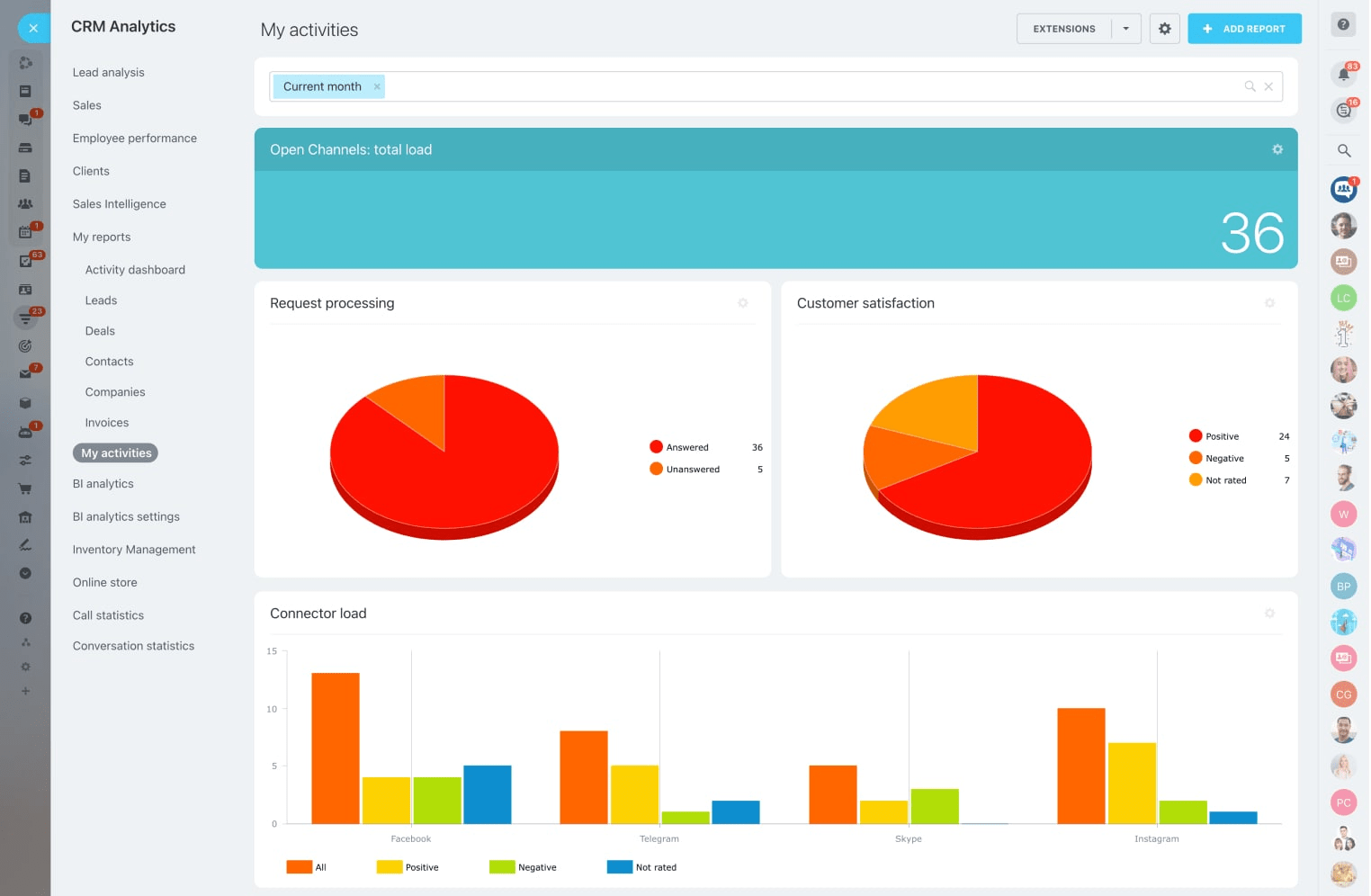
Image Source: Bitrix24
Bitrix24 worked best when I needed a CRM and internal collaboration tool in one place. I managed leads, assigned tasks, and tracked deals through visual pipelines. The automation was basic but saved time on repetitive steps like task creation and lead routing.
I also used it to handle internal communication—chat, calls, shared calendars—all built in. That reduced switching between tools. But the interface had too many modules by default, and I had to spend time customizing it. Performance slowed when working with larger contact lists, and live support wasn’t always responsive.
Bitrix24 isn’t lightweight, but if your team needs a mix of sales tracking and project coordination in one app, it gets the job done better than most Monday.com competitors I tested.
What You’ll Like:
- Complete sales cycle management, handling everything from initial lead capture to final customer service touchpoints
- Pre-built email campaigns and web forms for lead generation
- One unified platform for CRM, project management, chat, video calls, and docs
- Centralized document management for better sharing and co-authoring
Ideal For:
Teams that need a central workspace to manage sales and internal collaboration, especially in remote or multi-role setups.
What Real Users Are Saying:
“I consider Bitrix24 to be quite comprehensive, lightweight, and constantly evolving, allowing for a very high level of integrations via API. We use the CLOUD + APP version. Comparing the feature offerings of Bitrix and its cost… it’s a very easy decision. The support service works very well. I emphasize that we use the Enterprise version.” – Pedro G. (G2)
Ratings:
- G2 Rating: 4.1/5
- Capterra Rating: 4.2/5
Read More: 7 Best Bitrix24 CRM Alternatives
6. Trello- Best for Lightweight, Visually-Oriented CRM
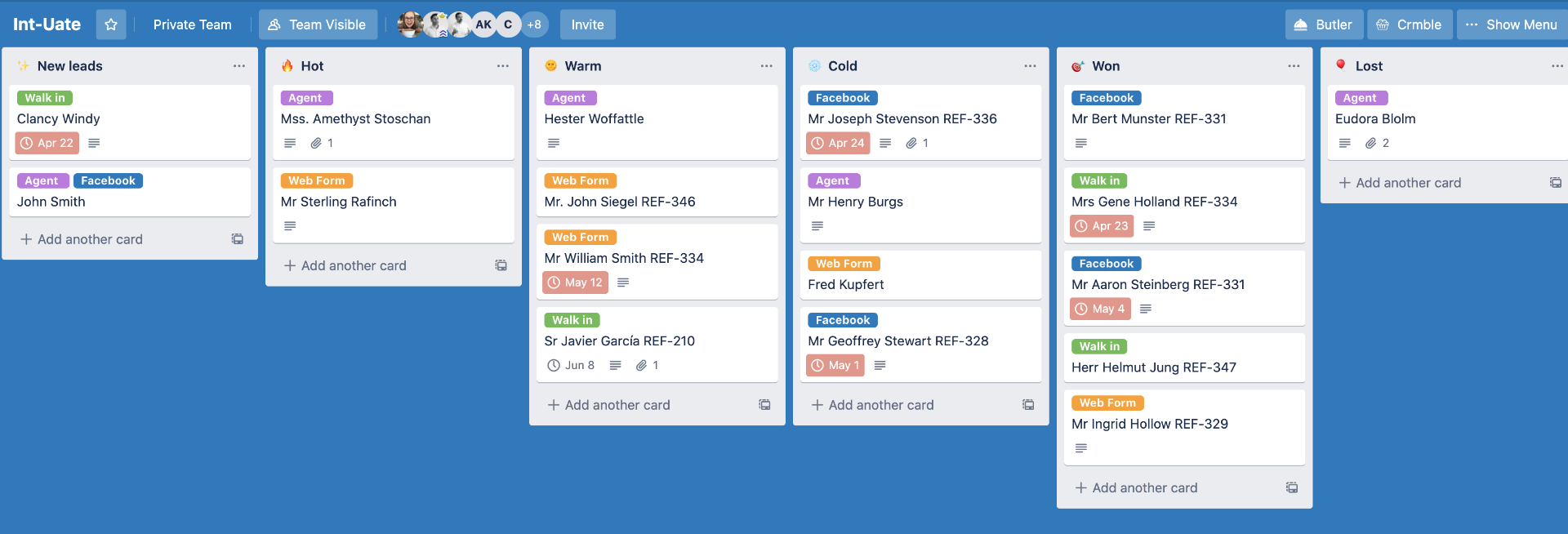
Image Source: Atlassian Community
When I used Trello for sales, it was clear this tool was made for visual thinkers. I created a board that mirrored my sales funnel—from leads to closed deals—and moved cards between stages with a satisfying drag-and-drop. Each card held client info, checklists, files, and reminders—no switching tabs required.
The Power-Ups and native automation (Butler) let me tag stalled deals or send reminders without constant oversight. Adding calendar or timeline views made follow-ups and planning simple. Plus, integrations with Slack and Google Drive meant everything stayed connected without a separate CRM.
That said, I had to be intentional about keeping things organized. Without clear labels or archiving habits, boards became cluttered fast. And while Trello gave me visibility, it lacked built-in reporting and contact-level analytics.
What You’ll Like:
- Highly visual Kanban board with drag-and-drop simplicity
- Power-Ups connect various apps to your boards, expanding Trello’s core functionality
- Pre-built, customizable templates to quickly set up your CRM system
- Butler automation handles routine reminders and status moves
Ideal For:
Small sales teams, freelancers, or consultants who value visual clarity and simplicity over heavyweight CRM features.
What Real Users Are Saying:
“I particularly enjoy Trello’s user-friendliness — its drag-and-drop functionality is intuitive and makes managing tasks straightforward and visual. The ease of implementation is also a bonus, with little setup required to get started using it. I also enjoy the ease of integration with other tools like Slack and Google Drive for integrated workflows. Plus, the customer support team is responsive when I’ve had questions.” – Vincent (G2)
Ratings:
- G2 Rating: 4.5/5
- Capterra Rating: 4.5/5
Pricing:
Starts at $5/user/month.
7. HubSpot- Best for Unifying Sales, Marketing & Support Efforts

Image Source: HubSpot
When I implemented HubSpot, the thing that stood out was how it unified my entire customer journey—marketing, sales, and support—all under one platform. Emails, web visits, calls, and chats automatically logged together into contact records, giving me a full view of every interaction without juggling multiple tools.
What really helped was the email tracking and automation. I got notified when a prospect opened an email or clicked a link, so I could follow up immediately. HubSpot also let me set automated workflows—for example, sending a sequence of emails when someone downloaded a whitepaper—without needing to code.
However, this depth comes with complexity. Initial setup took time—customizing pipelines, workflows, and sequences. And while the free tools are solid, key features like advanced analytics, ad management, or service automation quickly move into paid tiers.
What You’ll Like:
- Automatically logs emails, calls, chat, and website behavior into unified contact timelines
- Modular workflows for nurturing, lead scoring, and internal tasks
- Visual sales dashboards and detailed reporting across marketing, pipeline, and service
- Real-time email open/click notifications to trigger timely follow-ups
Ideal For:
Mid-size teams or growing businesses that want a single system to manage marketing campaigns, sales pipelines, and support tickets—without pulling in multiple tools.
What Real Users Are Saying:
“I probably would recommend it. It’s been really helpful for keeping everything in one place — emails, landing pages, analytics, all that. It’s pretty intuitive once you get the hang of it. I will say it’s not the cheapest option out there, but if someone’s looking for a solid marketing tool and can make use of the features, I’d say go for it.” – Jessica (Capterra)
Ratings:
- G2 Rating: 4.5/5
- Capterra Rating: 4.5/5
Pricing:
Starts at $15/user/month.
Evaluation Criteria
The evaluation of products or tools chosen for this article follows an unbiased, systematic approach that ensures a fair, insightful, and well-rounded review. This method employs six key factors:
- User Reviews / Ratings: Direct experiences from users, including ratings and feedback from reputable sites, provide a ground-level perspective. This feedback is critical in understanding overall satisfaction and potential problems.
- Essential Features & Functionality: The value of a product is ascertained by its core features and overall functionality. Through an in-depth exploration of these aspects, the practical usefulness and effectiveness of the tools are carefully evaluated.
- Ease of Use: The user-friendliness of a product or service is assessed, focusing on the design, interface, and navigation. This ensures a positive experience for users of all levels of expertise.
- Customer Support: The quality of customer support is examined, taking into account its efficiency and how well it supports users in different phases – setting up, addressing concerns, and resolving operational issues.
- Value for Money: Value for money is evaluated by comparing the quality, performance, and features. The goal is to help the reader understand whether they would be getting their money’s worth.
- Personal Experience / Experts’ Opinions: This part of the evaluation criteria draws insightful observations from the personal experience of the writer and the opinions of industry experts.
Monday CRM Alternatives – Detailed Feature Comparison
Here’s a quick side-by-side look at how these Monday CRM alternatives compare in terms of automation, email tools, pipeline views, and reporting capabilities.
| Tool | G2 Rating | Capterra Rating | Automation | Email Tools | Pipeline View | Reporting & Analytics |
|---|---|---|---|---|---|---|
| BIGContacts | 4.6/5 | 4.4/5 | Full automation | Built-in advanced email marketing | Visual board | Robust, insightful |
| Nutshell | 4.3/5 | 4.3/5 | Yes | Drip + Broadcast | Multiple views | Good |
| Zoho CRM | 4.0/5 | 4.2/5 | Yes | Omnichannel + Templates | Custom stages | Advanced |
| Copper | 4.6/5 | 4.7/5 | Basic | Gmail-integrated | Kanban style | Custom reports |
| Bitrix24 | 4.1/5 | 4.2/5 | Basic | Basic campaigns | Built-in | Limited |
| Trello | 4.5/5 | 4.5/5 | Butler automation | Via Power-Ups | Drag-and-drop board | Minimal (Power-Up needed) |
| HubSpot | 4.5/5 | 4.5/5 | Advanced | Advanced tracking + workflows | Visual + analytics | Advanced dashboards |
Maximize ROI With a CRM Built for Your Goals
Choosing a CRM isn’t just about features—it’s about aligning your tool with the way your team works, sells, and grows. Whether you’re focused on simplifying lead management, improving outreach, or gaining more visibility into your pipeline, the right alternative to monday.com can make a measurable difference in your daily workflow and long-term revenue.
As you compare options, look for tools that match your business size, sales process, and collaboration style. If you’re starting out or scaling with a tight budget, solutions like BIGContacts offer just the right blend of automation, contact management, and email marketing, without unnecessary overhead. And with a forever free plan for small teams, it’s a smart way to start seeing value right away.
Take your time, explore the trials, and choose a CRM that feels built for your goals, not just your tasks.
Frequently Asked Questions
Is there a free alternative to Monday CRM?
Yes—HubSpot CRM, Zoho CRM (free for up to 3 users), BIGContacts (forever free for small teams), and Trello all offer no-cost plans, which can be more affordable than Monday’s limited free usage.
Can I keep using my Monday.com data if I switch CRMs?
Yes, many CRM tools support CSV or Excel imports, and some have integrations designed specifically for migrating from Monday.com.
How do I migrate data from Monday.com to alternatives safely?
To migrate data safely from Monday.com to an alternative CRM solution, first, export your data from Monday.com into CSV or Excel files. Then, organize these files according to the import requirements of your new CRM. If you choose a CRM like BIGContacts, you can use an import template to handle the data transfer smoothly. Finally, verify the imported data for accuracy and completeness. This process ensures a secure and error-free data migration.
FREE. All Features. FOREVER!
Try our Forever FREE account with all premium features!

